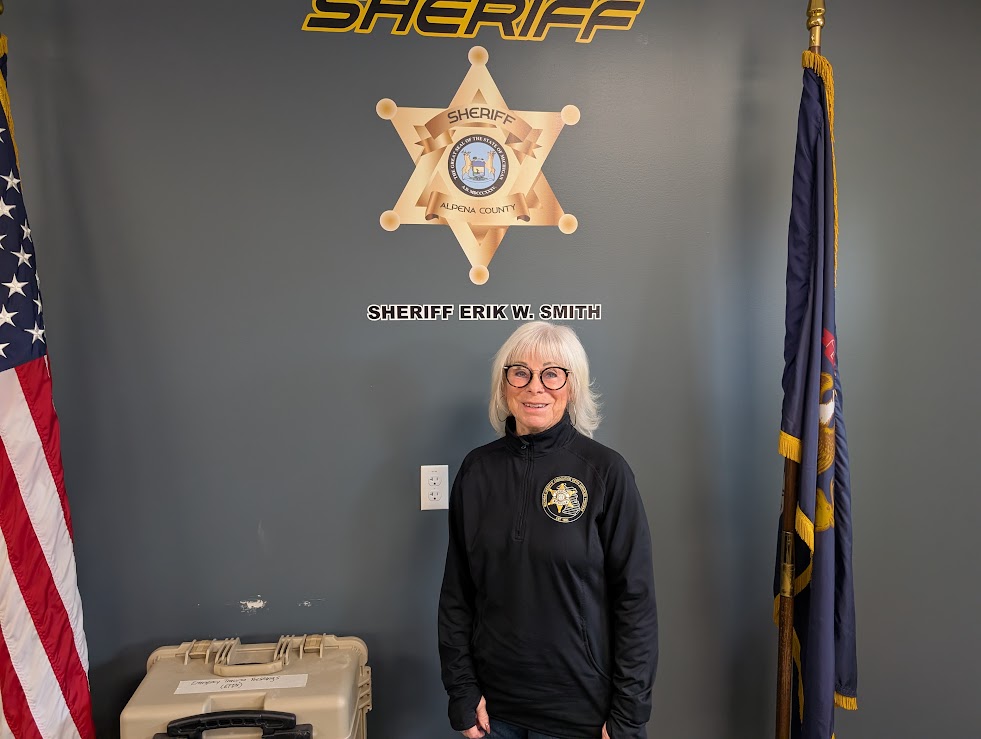Victim advocate continues to help others after 28 years

News Photo by Reagan Voetberg Diane Sims, director of the Alpena County victim services unit, is pictured at the sheriff’s office on April 10. Sims has volunteered in the victim services unit for 28 years.
ALPENA — For the past 28 years, Diane Sims, director of the Alpena County victim services unit, has given her time to comfort and assist people who are victims of crimes or emergency situations.
As a victim advocate, Sims is on call to help people 24 hours a day, seven days a week. She could get called by any of the public safety agencies in town, from the fire department to the Michigan State Police, she said.
Sometimes she receives calls to come to the emergency room, where she is usually asked to comfort a family who has just received a death notification.
In Alpena County, all victim advocates are volunteers, although other counties with more resources might pay their victim advocates, Sims said.
Sims worked as a physician recruiter for the Alpena hospital for 24 years. In her position, she could come and go as she wanted, making it easy to volunteer as a victim advocate at the same time.
After working at the hospital, Sims was a recruiter for the Northeast Michigan Community Mental Health Authority until she retired, or ‘worked herself out of a job,’ as she put it.
She was tasked with recruiting two psychiatrists and a child psychiatrist, and once she did that, there wasn’t anything else to do.
Now, she uses her time to volunteer and support others.
Sims said calls are unpredictable. Sometimes, she won’t be called for a month, and other times, she’ll have three calls in a day, one after the other. She’ll often receive a higher volume of calls during the holidays.
When Sims is on a call, she can provide a couple of different services, according to a “What do victim advocates do?” handout. She can offer short-term counseling for victims and families, an explanation of the criminal justice process, limited transportation, and assistance and referrals for emergency food, shelter, medical, and/or legal services.
If necessary, she can act as a liaison for the victim with deputies, detectives, fire, or medical personnel.
All information shared with Sims by a victim is confidential. Information is only shared with associate advocates in the event that they need to assume responsibility or for case review, according to the victim services brochure from the Alpena County Sheriff’s Office. Victims are informed that whatever they say may be repeated to the investigator in the event that it will help the case.
If she’s on the scene of a crime or emergency situation, Sims helps public safety personnel by making sure that the victim is not interfering with the investigation process. She makes sure that the victim is away from the scene and assists them while allowing public safety personnel to do their jobs. Sims will not leave a victim until family or loved ones arrive, or until the scene is cleared by personnel.
Sims said she decided to become a victim advocate after being diagnosed and treated for breast cancer when she was 36.
“They didn’t know what to do with me here,” she said. “They kind of did biopsies and things here, and then I ended up going to Ann Arbor for the treatment, things like that, because we didn’t have a cancer center here.
“After going through that, I looked at it like, if anything like that happened to anybody else, I would hope that someone would be helpful,” Sims said. “People, when they’re having an emergency or a trauma or something, it’s always nice for somebody to be there and listen and comfort them.”
Sims said there are 12 victim advocates in the county. Of those 12, many like Sims have faced serious health diagnoses that moved them to become victim advocates. One team member has had a heart transplant, Sims said.
It takes a special sort of person to be a victim advocate.
“Sometimes, you get home from a call at 3 or 4 o’clock in the morning,” Sims said. “And of course you can’t sleep. So you walk the dog, bake cookies, do whatever you want, because your adrenaline is just going through the roof. But there’s always a good feeling that you were there for somebody when they needed you.”






